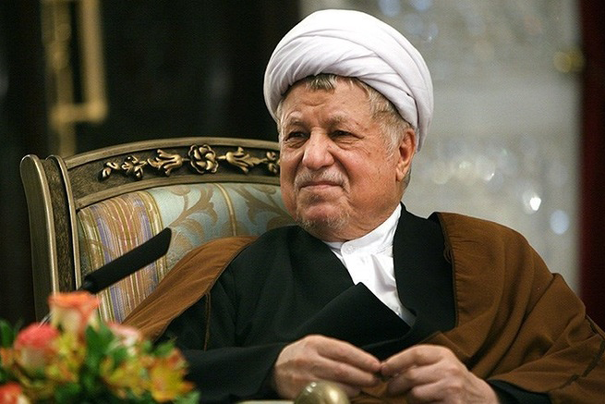
The Islamic Republic of Iran’s political fabric was irretrievably torn this week when former President Akbar Hashemi Rafsanjani died at his home at the age of 82.
In a series of tweets, the country’s Supreme Leader Ayatollah Ali Khamenei eulogised Rafsanjani while also alluding to the increasing divide that emerged between the two men over time. “With loss of Hashemi I don’t know any other figure with whom I share so many experiences & long history in ups & downs of this historic era,” he declared shortly after news of Rafsanjani’s death came in.
Three people above all others built and then sustained the Islamic Republic. The first is its founder, Ayatollah Ruhollah Khomeini. The other two are Rafsanjani and Khamenei; and Rafsanjani far outstrips Khamenei in terms of the role he played in creating post-1979 revolutionary Iran. Yet, unlike Khamenei, he never rose to the highest office. And in this singular fact lies the key to both his personality and his achievements.
Rafsanjani was always a kingmaker with little interest in ever becoming a king. It was he who enabled Khamenei to become Supreme Leader in the first place, telling the Assembly of Experts (the body charged with electing the Supreme Leader) that Khomeini had mentioned Khamenei to him as his preferred successor. Khamenei never had the proper religious credentials to become Supreme Leader but with Rafsanjani's backing he took the crown. Put simply: it took Rafsanjani’s influence to shunt him into a position he didn’t deserve.
Rafsanjani's thinking was clear: he’d be the power behind the throne while Khamenei would be the public face. This allowed him to maintain political control while getting on with the other thing that delighted him: making money. With a fortune estimated to be in the billions, it was yet another task at which he excelled.
While Khamenei became Supreme Leader, Rafsanjani was content to become President (from 1989 to 1997), the second most powerful figure in the Islamic Republic. It was here that his political worldview became most clear to see: a mix of what might best be described as conservatism combined with mercantile pragmatism. Rafsanjani was painfully aware of how an isolated Iran had suffered during the 1980-1988 Iran-Iraq War. He brought western-educated technocrats into government; he sought new trading partners with gusto.
But he made two catastrophic mistakes. The first was to allow Iran’s Revolutionary Guards (IRGC) into the Iranian economy, and in so doing empower them financially and politically. He inadvertently helped turn them from just a military organisation into a force that would permeate and then dominate all levels of Iranian society. The resurgent Islamic Republic we see today – with the country meddling across the Middle East from Yemen to Iraq to Lebanon to Syria – is due to an IRGC-dictated Iranian foreign policy that can be traced back – in part – to that decision.
The second was to believe that he could control Khamenei forever. As time passed the latter increasingly chafed at Rafsanjani’s interference and began to consolidate power. Matters came to a head after the 2009 “Green Movement” uprising, in which Iranians took to the streets in protest at the fraudulent re-election of President Mahmoud Ahmadinejad. Such was the uproar that Khamenei was forced to break with protocol and publicly intervene in an Iranian election to support the IRGC-backed Ahmadinejad.
Rafsanjani had – cautiously – offered support to the protesters but they were crushed, and with it, his political standing diminished. He tried to take Khamenei on and he lost – and from there on he became an increasingly virulent critic of government policy. This served merely to get up Khamenei’s nose even more and in 2013 Rafsanjani was banned from even standing in the Presidential elections. Ever the political operator, he instead threw his support behind the “moderate” candidate Hassan Rouhani.
It was support that would prove vital. Despite being cast out of the innermost elite circles he retained great stature in Iran and the political networks that went with it. Rouhani won, and with Rafsanjani as a quasi-mentor figure, began to make good on his campaign promises of improving Iran’s relations with the world and resolving Iran’s decade-old nuclear crisis. The nuclear deal, implemented on 16 January 2016, carried Rafsanjani’s blessing.
Rafsanjani’s death marks a crossroads: both in terms of Iran’s past and its future. Of the Islamic Republic’s founders only Khamenei now remains. But more than this, with Rafsanjani gone the more moderate, open vision of Iran that Rouhani as President wants to promote is now in danger.
The nuclear deal was struck to the great dissatisfaction of many hardliners who do not wish to see détente with the US. A fundamental principle of the Islamic Republic is its opposition to the West, especially the American “Great Satan”. A warming of relations threatens this: if there is no enemy against which the country can unite, many more may question what the point of the Islamic Republic – with all the tyranny and economic mismanagement it has brought – actually is.
Rouhani will have to face this year’s presidential elections without the support of his former mentor, whose death has simultaneously weakened him and empowered Iran’s hardliners. Khamenei needed sanctions lifted on Iran so he swallowed the nuclear deal. But he doesn’t want any further improvement of relations with the West, and neither does the IRGC. Rouhani now faces a battle that is infinitely harder than it was 48 hours ago. It is likely that the nuclear deal will hold; Khamenei needs it, and Trump, for all his rhetoric, is likely to be too interested in the potential economic benefits for US companies in accessing the Iranian market, to renege on it.
But the future of improved relations between Iran and the West now looks in greater jeopardy than at any time since Rouhani took office in 2013. Rafsanjani’s death does not bode well – either for Iran or for the world.